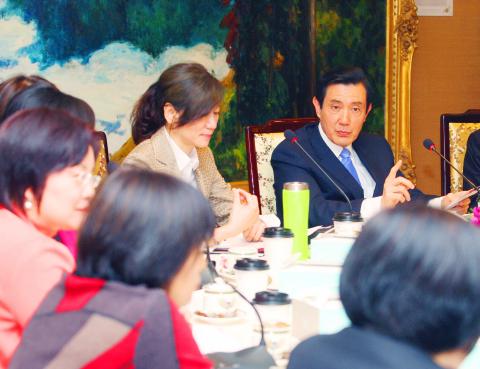President Ma Ying-jeou (馬英九) yesterday met representatives of Mom Loves Taiwan, an association of mothers against nuclear power, at the Presidential Office for a hearing on nuclear safety.
The association was founded by several female public figures and celebrities, including Fubon Cultural and Educational Foundation board director Irene Chen (陳藹玲). Representatives who attended the meeting included Taiwan Foundation for Rare Disorders chairperson Serena Chen (陳莉茵), Taipei Parents’ Association member Chang Yu-huei (常玉慧) and others, as well specialists.
When the association was established earlier this year, it said its main goals were to make Taiwan Power Co (Taipower, 台電) disclose all the facts about safety at nuclear power plants, become a platform for civic discussion, demand all dangerous nuclear plants stop operation, stop the construction of the Fourth Nuclear Power Plant and review and discuss new energy policies.

Photo: CNA
The Presidential Office said on Friday that before the national anti-nuclear protest on March 9, the office had already noticed that the public was concerned about nuclear safety and began making contact with civic groups, hoping to communicate with them.
Before the meeting, Irene Chen said the association would present four requests, including information disclosure, comprehensive re-evaluation of all nuclear power plants, new energy policies and that the Fourth Nuclear Power Plant issue not be decided by referendum.
Irene Chen said the association is not an anti-nuclear group, but aims to monitor, question and disseminate correct information on nuclear safety so people can make informed decisions. However, she said the safety of the Fourth Nuclear Power Plant is a big concern.
Ma said the government’s nuclear power policy is to “ensure nuclear safety, steadily reduce [the use of] nuclear power, create a green low carbon environment and gradually achieve a nuclear-free homeland.”
However, the goal must be achieved without power rationing, while maintaining reasonable electricity rates and abiding by international commitments on carbon reduction, he said.
As to the disposal of nuclear waste, Atomic Energy Council (AEC) Minister Tsai Chuen-horng (蔡春鴻) said there are about 80 low-radiation final disposal sites in the world, so the technology to achieve it should not be a problem, and spent fuel pools or deep underground storage for highly radioactive fuel rods are being planned.
Responding to concerns about the high population density in Greater Taipei near three nuclear power plants, as mentioned in the journal Nature in 2011, Premier Jiang Yi-huah (江宜樺) said it was a misunderstanding and the article highlighted the culture of safety and safety procedures rather than the density of the nearby population.
National Tsing Hua University nuclear engineering professor Yu Ge-ping (喻冀平) said nuclear power plants around the world are located within 75km of high population areas because the power demands are higher in these areas, and population density in these areas is not directly connected to nuclear safety.
However, several representatives were not satisfied with those answers and said the threat posed by radiation to people in a 20km range is different than posed to people within 75km, and “we care about the people [in this area].”

The Ministry of the Interior (MOI) is to tighten rules for candidates running for public office, requiring them to declare that they do not hold a Chinese household registration or passport, and that they possess no other foreign citizenship. The requirement was set out in a draft amendment to the Enforcement Rules of the Public Officials Election and Recall Act (公職人員選舉罷免法 ) released by the ministry on Thursday. Under the proposal, candidates would need to make the declaration when submitting their registration forms, which would be published in the official election bulletin. The move follows the removal of several elected officials who were

The Republic of China (ROC) is celebrating its 114th Double Ten National Day today, featuring military parades and a variety of performances and speeches in front of the Presidential Office in Taipei. The Taiwan Taiko Association opened the celebrations with a 100-drummer performance, including young percussionists. As per tradition, an air force Mirage 2000 fighter jet flew over the Presidential Office as a part of the performance. The Honor Guards of the ROC and its marching band also heralded in a military parade. Students from Taichung's Shin Min High School then followed with a colorful performance using floral imagery to represent Taiwan's alternate name

FOUR DESIGNATED AREAS: Notices were issued for live-fire exercises in waters south and northwest of Penghu, northeast of Keelung and west of Kaohsiung, they said The military is planning three major annual exercises across the army, navy and air force this month, with the navy’s “Hai Chiang” (海強, “Sea Strong”) drills running from today through Thursday, the Ministry of National Defense said yesterday. The Hai Chiang exercise, which is to take place in waters surrounding Taiwan, would feature P-3C Orion maritime patrol aircraft and S-70C anti-submarine helicopters, the ministry said, adding that the drills aim to bolster the nation’s offshore defensive capabilities. China has intensified military and psychological pressure against Taiwan, repeatedly sending warplanes and vessels into areas near the nation’s air defense identification zone and across

A Chinese takeover of Taiwan would severely threaten the national security of the US, Japan, the Philippines and other nations, while global economic losses could reach US$10 trillion, National Security Council Deputy Secretary-General Lin Fei-fan (林飛帆) wrote in an article published yesterday in Foreign Affairs. “The future of Taiwan is not merely a regional concern; it is a test of whether the international order can withstand the pressure of authoritarian expansionism,” Lin wrote in the article titled “Taiwan’s Plan for Peace Through Strength — How Investments in Resilience Can Deter Beijing.” Chinese President Xi Jinping’s (習近平) intent to take Taiwan by force